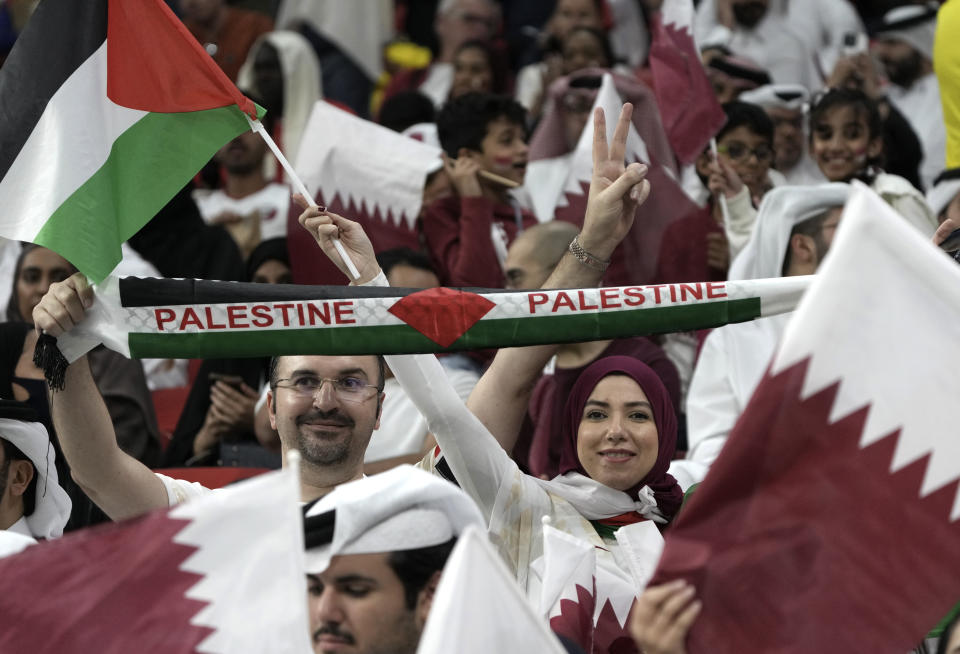Israeli-Palestinian conflict catches up with Qatar World Cup
DOHA, Qatar (AP) — It was uncharted territory for the Israeli journalist. Wandering through the rustic outdoor marketplace in Doha before the start of the World Cup, he zeroed in on a Qatari man in his traditional headdress and white flowing robe and asked for an interview.
“Which channel?” the Qatari asked. The journalist replied he was from Kan, Israel's public broadcaster.
The Qatari was stunned. “Where?”
“Israel," the journalist repeated. A split-second later, the interview was over.
The exchange ricocheted around social media, reflecting the latest political flash point at the first World Cup in the Arab world — never mind that neither Israeli nor Palestinian national teams are competing in the tournament.
Controversy has followed Israelis and Palestinians pouring into Doha, revealing just how entrenched and emotive their violent century-old conflict remains, including Israel's open-ended occupation of lands Palestinians want for a future state.
Palestinians shared footage of the Doha encounter between the Qatari man and the Israeli journalist, along with other clips of Palestinians and Qataris angrily confronting Israeli reporters live on TV. They viewed it as proof that although Qatar has permitted Israelis to fly directly to Doha and receive consular support for the first time in history, the conservative Muslim emirate has no intention of cozying up to Israel.
Israel's Channel 13 sports reporter, Tal Shorrer, said he has been shoved, insulted and accosted by Palestinians and other Arab fans during his live reports from the tournament.
“You are killing babies!” a few Arab fans yelled as they rammed into him during a broadcast this week.
Qatari media meanwhile has published some such videos with the caption: “No to normalization.” Officials in Qatar, with their history of public support to Palestinians, have insisted the temporary opening to Israelis was purely to comply with FIFA hosting requirements — not a step to normalizing ties like neighboring Bahrain and the United Arab Emirates did in 2020. Qatar has warned a spike in violence in the occupied West Bank or Gaza Strip would derail the arrangement.
Nonetheless, thousands of Israeli soccer fans are expected to descend on Doha for the World Cup, diplomats say, including some on 10 direct flights planned over the next month.
Many Israeli fans marvel over the intriguing novelty of being in a country that has no diplomatic relations with Israel. Security-minded citizens remark how safe they feel.
“My friends and family thought it could be dangerous but it’s fine,” said Eli Agami, an aviation executive who lives near Tel Aviv. “I don't go around telling people but I think no one cares if you're Israeli or you're Jewish. Everyone just cares about the game.”
Six Israeli diplomats have set up shop at a travel agency office in Doha, ready to respond to crises large and small. To limit potential problems, the Foreign Ministry has launched a campaign urging Israelis to lie low.
“We want to avoid any friction with other fans and local authorities,” said Alon Lavie, a member of the delegation, citing legions of fans from Iran, Saudi Arabia and other countries either hostile or frosty toward Israel now flooding Qatar. “We want to remind (Israelis) ... you don't need to shove your fingers in other people's eyes.”

 Yahoo Autos
Yahoo Autos 

